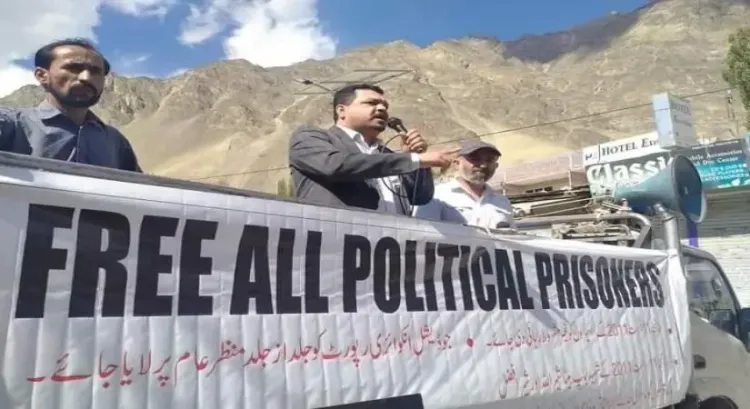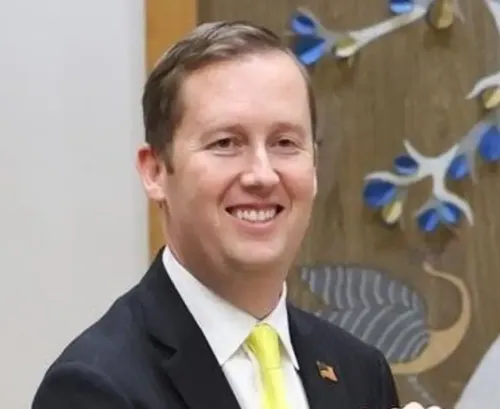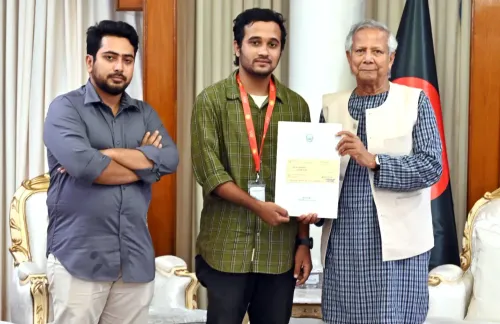Why are the People of Gilgit-Baltistan Demanding Justice and Autonomy?

Synopsis
Key Takeaways
- Residents of Gilgit-Baltistan are demanding autonomy and representation.
- The region is governed by decrees from Islamabad, lacking a constitutional framework.
- Protests are common due to issues like unfair taxation and land rights.
- The Karachi Agreement of 1949 contributed to governance challenges.
- External projects like CPEC have further complicated the situation.
Islamabad, July 26 (NationPress) The persistent neglect by successive governments of Pakistan towards the essential needs of the inhabitants of Pakistan-occupied Gilgit-Baltistan (PoGB) has created a governance structure that is merely ad hoc, dictated by decrees from Islamabad rather than participatory laws.
A report from the Washington-based Middle East Media Research Institute (MEMRI) indicates that residents frequently conduct protests in PoGB, often braving harsh winter temperatures to assert their rights to land, contest unfair taxation, endure long power outages, and oppose encroachment by projects such as the China Pakistan Economic Corridor (CPEC), which appropriates local land without offering any compensation.
The administration of PoGB has been governed by decrees and presidential mandates, denying the region representation in the National Assembly and excluding it from the constitutional framework that governs the rest of Pakistan, as highlighted by the research institute.
According to the MEMRI report, “This legal ambiguity stems from the Karachi Agreement of 1949, which transferred control of Gilgit-Baltistan to Pakistan without a single representative from the region. The governance model in PoGB reveals a colonial mindset, focusing on central authority over participatory development.”
Once referred to as “the last colony,” the urgent demands of Gilgit-Baltistan’s residents continue to be disregarded by mainstream political parties in Pakistan. Residents in Skardu, the largest city in PoGB, endure up to 22 hours of load shedding during winter, relying on underperforming hydroelectric projects like the Satpara Dam, designed to supply power to 40,000 homes but only delivering a fraction of that. Additionally, the region remains disconnected from the national power grid.
Protests frequently erupt in the area, with citizens demanding land rights, contesting unfair taxation, and resisting federal projects like CPEC. Anger has been directed at the GB Revenue Authority Bill, which imposes taxes without providing representation. Residents of PoGB lack voting rights in national elections and have no voice in the policymaking processes that affect their lives, according to the report.
PoGB remains subject to Pakistan's self-governance orders, which grant powers to the federal government while leaving local institutions ineffective. This has led to a growing demand for constitutional rights, political recognition, and genuine autonomy.
Activists like Shabir Choudhry, as stated in the MEMRI report, warn that the region is on the brink of chaos. With each passing year, protests intensify, and grievances deepen. The people of Gilgit-Baltistan are longing for justice, dignity, and the right to shape their own future, the report concludes.
Furthermore, the residents of PoGB were not consulted when Pakistan entered into a border agreement with China in 1963, ceding a portion of its territory south of the Mintaka Pass, historically belonging to Hunza, to Beijing. Moreover, the construction of the Karakoram Highway, which links Pakistan and China through Gilgit-Baltistan, has facilitated an uncontrolled influx of weapons, narcotics, and religious militias into the region. These factors have destabilized the social fabric and caused a significant demographic shift, according to the report.









